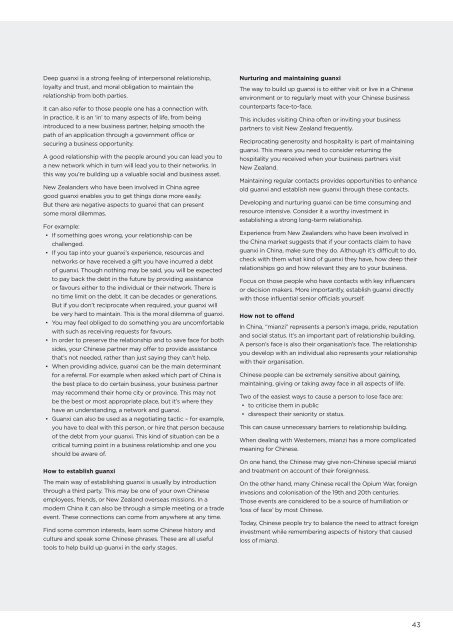Navigating China Guide (2012) - New Zealand Trade and Enterprise
Navigating China Guide (2012) - New Zealand Trade and Enterprise
Navigating China Guide (2012) - New Zealand Trade and Enterprise
You also want an ePaper? Increase the reach of your titles
YUMPU automatically turns print PDFs into web optimized ePapers that Google loves.
Deep guanxi is a strong feeling of interpersonal relationship,<br />
loyalty <strong>and</strong> trust, <strong>and</strong> moral obligation to maintain the<br />
relationship from both parties.<br />
It can also refer to those people one has a connection with.<br />
In practice, it is an ‘in’ to many aspects of life, from being<br />
introduced to a new business partner, helping smooth the<br />
path of an application through a government office or<br />
securing a business opportunity.<br />
A good relationship with the people around you can lead you to<br />
a new network which in turn will lead you to their networks. In<br />
this way you’re building up a valuable social <strong>and</strong> business asset.<br />
<strong>New</strong> <strong>Zeal<strong>and</strong></strong>ers who have been involved in <strong>China</strong> agree<br />
good guanxi enables you to get things done more easily.<br />
But there are negative aspects to guanxi that can present<br />
some moral dilemmas.<br />
For example:<br />
• If something goes wrong, your relationship can be<br />
challenged.<br />
• If you tap into your guanxi’s experience, resources <strong>and</strong><br />
networks or have received a gift you have incurred a debt<br />
of guanxi. Though nothing may be said, you will be expected<br />
to pay back the debt in the future by providing assistance<br />
or favours either to the individual or their network. There is<br />
no time limit on the debt. It can be decades or generations.<br />
But if you don’t reciprocate when required, your guanxi will<br />
be very hard to maintain. This is the moral dilemma of guanxi.<br />
• You may feel obliged to do something you are uncomfortable<br />
with such as receiving requests for favours.<br />
• In order to preserve the relationship <strong>and</strong> to save face for both<br />
sides, your Chinese partner may offer to provide assistance<br />
that’s not needed, rather than just saying they can’t help.<br />
• When providing advice, guanxi can be the main determinant<br />
for a referral. For example when asked which part of <strong>China</strong> is<br />
the best place to do certain business, your business partner<br />
may recommend their home city or province. This may not<br />
be the best or most appropriate place, but it’s where they<br />
have an underst<strong>and</strong>ing, a network <strong>and</strong> guanxi.<br />
• Guanxi can also be used as a negotiating tactic – for example,<br />
you have to deal with this person, or hire that person because<br />
of the debt from your guanxi. This kind of situation can be a<br />
critical turning point in a business relationship <strong>and</strong> one you<br />
should be aware of.<br />
How to establish guanxi<br />
The main way of establishing guanxi is usually by introduction<br />
through a third party. This may be one of your own Chinese<br />
employees, friends, or <strong>New</strong> <strong>Zeal<strong>and</strong></strong> overseas missions. In a<br />
modern <strong>China</strong> it can also be through a simple meeting or a trade<br />
event. These connections can come from anywhere at any time.<br />
Find some common interests, learn some Chinese history <strong>and</strong><br />
culture <strong>and</strong> speak some Chinese phrases. These are all useful<br />
tools to help build up guanxi in the early stages.<br />
Nurturing <strong>and</strong> maintaining guanxi<br />
The way to build up guanxi is to either visit or live in a Chinese<br />
environment or to regularly meet with your Chinese business<br />
counterparts face-to-face.<br />
This includes visiting <strong>China</strong> often or inviting your business<br />
partners to visit <strong>New</strong> <strong>Zeal<strong>and</strong></strong> frequently.<br />
Reciprocating generosity <strong>and</strong> hospitality is part of maintaining<br />
guanxi. This means you need to consider returning the<br />
hospitality you received when your business partners visit<br />
<strong>New</strong> <strong>Zeal<strong>and</strong></strong>.<br />
Maintaining regular contacts provides opportunities to enhance<br />
old guanxi <strong>and</strong> establish new guanxi through these contacts.<br />
Developing <strong>and</strong> nurturing guanxi can be time consuming <strong>and</strong><br />
resource intensive. Consider it a worthy investment in<br />
establishing a strong long-term relationship.<br />
Experience from <strong>New</strong> <strong>Zeal<strong>and</strong></strong>ers who have been involved in<br />
the <strong>China</strong> market suggests that if your contacts claim to have<br />
guanxi in <strong>China</strong>, make sure they do. Although it’s difficult to do,<br />
check with them what kind of guanxi they have, how deep their<br />
relationships go <strong>and</strong> how relevant they are to your business.<br />
Focus on those people who have contacts with key influencers<br />
or decision makers. More importantly, establish guanxi directly<br />
with those influential senior officials yourself.<br />
How not to offend<br />
In <strong>China</strong>, “mianzi” represents a person’s image, pride, reputation<br />
<strong>and</strong> social status. It’s an important part of relationship building.<br />
A person’s face is also their organisation’s face. The relationship<br />
you develop with an individual also represents your relationship<br />
with their organisation.<br />
Chinese people can be extremely sensitive about gaining,<br />
maintaining, giving or taking away face in all aspects of life.<br />
Two of the easiest ways to cause a person to lose face are:<br />
• to criticise them in public<br />
• disrespect their seniority or status.<br />
This can cause unnecessary barriers to relationship building.<br />
When dealing with Westerners, mianzi has a more complicated<br />
meaning for Chinese.<br />
On one h<strong>and</strong>, the Chinese may give non-Chinese special mianzi<br />
<strong>and</strong> treatment on account of their foreignness.<br />
On the other h<strong>and</strong>, many Chinese recall the Opium War, foreign<br />
invasions <strong>and</strong> colonisation of the 19th <strong>and</strong> 20th centuries.<br />
Those events are considered to be a source of humiliation or<br />
‘loss of face’ by most Chinese.<br />
Today, Chinese people try to balance the need to attract foreign<br />
investment while remembering aspects of history that caused<br />
loss of mianzi.<br />
43
















